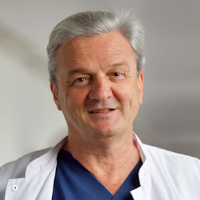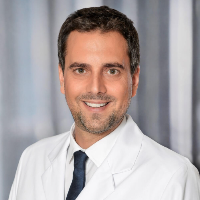Prostate Cancer With Metastases — Removal of Prostate Tumor Metastases With a Gamma Probe: treatment in the Best Hospitals in the World
Treatment prices are regulated by national law of the corresponding countries, but can also include additional hospital coefficients. In order to receive the individual cost calculation, please send us the request and medical records.

Department of Adult and Pediatric Urology, Andrology
The Department of Adult and Pediatric Urology, Andrology offers the full range of services in the areas of its specialization. Men and boys with diseases of the reproductive system can be diagnosed and treated in the medical facility. Doctors also treat infertility and erectile dysfunction. Medical care is provided to men and women with diseases of the urinary system, namely kidneys, ureters, bladder, and urethra. The department is certified as the Prostate Cancer Center by the German Cancer Society (DKG), which indicates the excellent quality of the services provided in this area. The department's urologists have a perfect command of the innovative treatment methods, including holmium laser enucleation of the prostate (HoLEP), photodynamic therapy, and da Vinci robot-assisted surgery. The department employs comprehensively trained and experienced doctors who apply advanced medical achievements in their practice. Each patient is provided with an individual approach, considering their specific needs and wishes.







Department of Adult and Pediatric Urology
The Department of Adult and Pediatric Urology provides high-precision diagnostic examinations and effective treatment for diseases of the genitourinary system and reproductive system in men and boys. Of particular interest is drug therapy and surgical treatment of prostate, bladder, kidney, testicular, and penile cancers. The department is part of the Comprehensive Cancer Center Ulm (CCCU). For the patient, this means that their clinical case is studied by a multidisciplinary tumor board, which determines the optimal treatment tactics. The department is also certified by the German Cancer Society (DKG), so all therapeutic procedures meet strict national and international standards. The department's team of urologists also has unique clinical experience in the minimally invasive treatment of kidney stone disease, benign prostatic hyperplasia, neuro-urological dysfunction, and all urologic diseases in children. During the surgical treatment, the specialists at the medical facility successfully use minimally traumatic surgical techniques. They perform endoscopic, laser, minimally invasive, and robot-assisted surgery using the innovative Da Vinci system. The department treats about 3,000 inpatients and 9,000 outpatients with clinical cases of varying complexity annually. The number of surgical procedures performed and treatment outcomes are regularly published by the authorized commission of the Initiative Quality in Medicine (IQM).







Department of Urology
According to the Focus magazine, the Department of Urology ranks among the top German medical institutions specializing in prostate cancer treatment! The department offers the full range of high-precision diagnostic studies and effective therapeutic options for men with diseases of the genitourinary system. The doctors of the department specialize in the treatment of prostate cancer, benign prostatic hyperplasia, kidney, testicular cancers, urolithiasis, erectile dysfunction and urinary incontinence. There are also excellent qualifications in the field of reconstructive urology.






Prostate cancer is a dangerous disease that occurs in men mostly over the age of 50, but younger men can be diagnosed with it as well. Prostate cancer can progress slowly and without manifesting itself for many years. That is why prostate cancer is often detected at advanced stages when symptoms of the disease arise.
Content
- The mechanism of metastases development
- How prostate cancer metastases are treated?
- Why use a gamma probe for prostate surgery?
- How is surgery with a gamma probe carried out?
- The cost of treatment of prostate cancer with metastases in European hospitals
- Undergoing treatment of prostate cancer with metastases in Europe
The mechanism of metastases development
So, how exactly prostate cancer and lymph nodes are connected? The answer lies in the pathophysiology of tumor spreading. The fact is that lymph nodes are collectors of everything foreign in the body, be it bacteria, viruses, or cancer cells. So, the harmful agent is captured and transported to the lymph nodes. Some cancerous cells, however, have developed the so-called genetic escape from the detection by the immune system. This means that the surface of the tumor is "invisible" to the immune system, which allows it to spread throughout the body. By the way, modern methods of cancer treatment, the so-called "cancer vaccines", are aimed precisely at activating a patient's own defense and increasing the detectability of the tumor.
The mechanism of prostate cancer metastasizing includes the ability of cancer cells to move from the tumor in the prostate gland throughout the body with fluids, i.e. blood and lymph. This occurs due to angiogenesis – the formation of new blood vessels in the malignant tumor that eventually sprouts into the systemic bloodstream. As this process takes time, metastases in most cases do not arise until the advanced stages of cancer.
Prostate cancer most often metastasizes to the lungs, bones (especially the lumbar and thoracic spine, and pelvic bones), and regionally – to the pelvic lymph nodes. Treatment of prostate cancer metastases depends on their localization. In the majority of cases, after detecting prostate cancer metastases the patient receives hormone therapy (less often chemotherapy is administered, if hormone therapy is ineffective). Hormone therapy is based on suppressing tumor growth by slowing down the division of prostate cells with substances that block testosterone action. Radiation therapy may be carried out simultaneously with hormone therapy.
At the advanced stages of prostate cancer, specialists sometimes tend to the watchful waiting and the active surveillance tactics. This therapeutic approach is especially preferable for older men with comorbidities which can lead to complications during more active treatment. Such patients should be examined regularly (including a prostate ultrasound scan) and have their PSA blood levels assessed.
Although the prognosis of prostate cancer treatment generally depends on the stage of the disease, stages 3 and 4 of prostate cancer are still treatable. Modern methods of controlling the development of the tumor and metastases, as well as currently available medications and therapy methods, are able to significantly improve the patient's condition and prolong life. However, the earlier a patient seeks qualified help, the better the prognosis for prostate cancer treatment is.
How prostate cancer metastases are treated?
Surgery for prostate cancer treatment is performed primarily in prostate cancer patients without lymph node metastases.
Laparoscopic radical prostatectomy is the complete removal of the prostate gland through several small punctures in the anterior abdominal wall. And again, removal of the prostate is performed when the tumor is limited to the capsule of the organ, without invasion into adjacent organs and without distant metastases. The presence of tumor cells is usually detected with the help of the regional lymph node biopsy, as well as histological examination of the tissues that are removed during a surgery.
There are several alternatives to this intervention, depending on the degree of malignancy and a large number of prognostic indicators:
- Active surveillance implies control of the tumor process (PSA blood levels, lymph node biopsy, MRI) and shifting to surgical treatment in case of the disease progression. Active surveillance is performed for low-risk cancer cases.
- Distant radiation therapy or brachytherapy. These methods are not radical but are an indisputable alternative to surgery.
- High-intensity focused ultrasound (HIFU) – the non-invasive procedure that heats and destroys cancer cells.
- Cryoablation, if the general somatic condition of the patient implies a high risk of complications during an invasive operation (laparoscopic radical prostatectomy) under general anesthesia.
- Chemotherapy or hormone therapy is performed in men with advanced prostate cancer.
Many surgeons and oncologists have long considered the detection of enlarged lymph nodes an extremely unfavorable prognostic factor that forces people to refuse radical surgery and to be satisfied with conservative treatment methods. However, recent studies have shown that even in lymph nodes affection, they can be detected and removed timely. In such case, the chances of recovery are quite high. Removal of the prostate gland along with the lymph nodes and hormone therapy is connected with the 10-year survival rate by 80%.
The benefit of removing lymph nodes is twofold: first, their examination helps make an accurate assessment of the condition and plan further treatment, and second, it is a therapeutic procedure. The criteria for eligibility are the clinical stage, PSA blood level, and Gleason score, which allow physicians to assess the risk of metastasizing to the lymph nodes.
Why use a gamma probe for prostate surgery?
Currently, surgeons cannot accurately detect the boundaries of a tumor and microscopic metastases during a surgery. As a result, millions of patients suffer from relapses or secondary cancers annually, as often the tumor or metastases are not removed completely or healthy tissue is removed unnecessarily.
The gamma probe is now certified in the European Union. The device is the first of its kind, allowing physicians to insert it through a cavity or standard laparoscopic port and search for lymph nodes and metastases that are labeled with a radioactive tracer. The gamma probe is moved within the body using a hand-held or robot instrument. Even though lymph node biopsy is one of the basic methods of metastases detection, for some types of cancer and for some lymph nodes localizations the effectiveness of this technique is low. In such cases, using a gamma probe during or after the prostatectomy is the option of choice.
The gamma probe is suitable for both manual and laparoscopic gamma, i.e. radioguided surgery. Attached to a 3-meter lightweight cable, the gamma probe is easily introduced through a standard 12-mm laparoscopic entry port.
The system is easy to use in the operating room. It can be integrated into the work of robot systems and systems for radioguided surgery. The technology provides accurate real-time detection of cancer cells and can be used for robot-assisted cancer surgery.
How is surgery with a gamma probe carried out?
Robot-assisted detection of sentinel lymph nodes using a lymphotropic substance is performed sequentially in two ways: at the preoperative stage by single-photon emission computed tomography and intraoperatively using a portable laparoscopic gamma probe, through measuring the level of gamma radiation. The prepared radiopharmaceutical is injected into the organ at four points in equal proportions, submucosally along the tumor perimeter. Registration of radioactive substance distribution in the pelvic region is performed on a gamma camera with two fixed detectors.
For the intraoperative detection of lymph node metastases of prostate cancer, a laparoscopic gamma scanner is used. This is a system consisting of a gamma probe for measuring local substance concentrations and special software. The scanner assesses the level of radioactivity at the place of injection of a radiopharmaceutical and in the projection of sentinel lymph nodes. The received results are displayed on the monitor. Intraoperative determination of sentinel lymph nodes is performed by the operating surgeon by measuring the level of radioactivity in retroperitoneal lymph nodes. The process can also be robot-assisted.
After detection, the lymph nodes that accumulate the substance actively are isolated from the surrounding tissue, removed and are subject to the histological and immunohistochemical laboratory examination. Intraoperatively, cytological examination can be performed. The surgeon continues checking and removing the affected lymphatic nodes until no malignant tissue is detected in the abdominal cavity and the pelvic region.
The cost of treatment of prostate cancer with metastases in European hospitals
The cost of prostate cancer treatment in Europe is affordable for both citizens and foreign patients. In European hospitals you can save a significant amount of money and get quality cancer treatment. At the same time, the quality of medical procedures performed in European hospitals meets the most stringent international standards.
The most important question for patients coming from abroad remains: what is the cost of treatment in Europe for prostate cancer? Well, the prices here are formed taking into account many factors. Therefore, it is difficult to get a specific cost of treatment in Europe without prior examination. For example, for a patient who went to a medical institution with prostate cancer diagnosed at an early stage, a specific cancer treatment regimen is prescribed. For patients whose cancer has already spread to distant organs (metastasize), the regimen will be quite different. This applies to the medications and procedures prescribed, the duration of treatment, and, accordingly, and to the final cost of prostate cancer treatment.
Prices for medical services in European hospitals are formed in accordance with the recommendations of the local Ministry of Health. The total cost of prostate cancer treatment will depend on the prices of diagnostic procedures and treatments prescribed. The therapeutic protocol most often includes surgery, chemotherapy, and radiotherapy. Some patients may need other treatments, such as brachytherapy, intraperitoneal hyperthermic chemotherapy, targeted or immunotherapy, robot-assisted or radioguided surgery, PSMA therapy with Lutetium-177, which will eventually influence the cost of prostate cancer treatment.
If you’d like to know what the cost of prostate cancer treatment will be like exactly for you, simply contact Booking Health.
Undergoing treatment of prostate cancer with metastases in Europe
Frankly, it is quite hard to figure out a way to start the treatment abroad. It seems like you have to know all the aspects of a treatment organization, including the list of necessary documents, trustworthy hospitals, factors that influence the prices for treatment, what to do if complications arise, etc.
That’s why Booking Health does what it does – helps people organize the treatment they need and where they want it. Booking Health knows how to resolve any issue related to treatment organization. You basically don't lose anything, well, except for the unnecessary stress.
If you would like to know the details, fill in the request form on the Booking Health website for us to contact you.
Authors: Dr. Vadim Zhiliuk, Dr. Sergey Pashchenko

